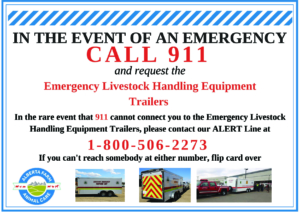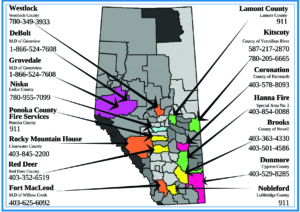Alberta’s livestock emergency response system proved its worth during response to a cattle trailer rollover in September, just months after hundreds of pigs died because of a breakdown in the same system.
Late in the morning on Sept. 13, a trailer hauling cattle rolled near Kitscoty, roughly 25 minutes west of Lloydminster.
Emergency crews seeking help for the animals in the trailer had their dispatcher contact Alberta Farm Animal Care, which co-ordinates a network of 15 livestock emergency trailers spotted throughout the province.
Miraculously, someone at the scene had already called the Count of Vermilion River County and its trailer was on its way from the yard in Kitscoty, carrying tools that emergency crews could use to safely manage and contain the cattle.
One animal had to be euthanized at the scene, but the remainder were saved, largely because of the speedy response, said Brett Bushell, general manager of Western Hog Exchange and a director on the board of Alberta Farm Animal Care.
“The system worked exactly the way it is supposed to,” said Bushell. “By the time we called (Kitscoty), the trailer had actually been dispatched and was headed out,” he said.
Response to the Kitscoty rollover lay in sharp contrast to a similar collision involving a livestock hauler earlier this year. More than 2,000 weaner pigs heading to the United States were killed after a collision near Standard, about one hour east of Calgary, because people at the scene were either unaware of the emergency trailers or did not know how to find them.
Some pigs died in the impact. But the survivors could not be freed from the trailer in time to save them from heat exhaustion and suffocation, swine producer Alastair Bratton said later.
The pig fatalities at Standard exposed a serious gap in the level of awareness concerning Alberta’s livestock emergency response system and its network of 15 equipment trailers, co-ordinated by AFAC.
In the weeks following the fatal collision at Standard, Bushell, Bratton and AFAC staff reviewed the knowledge gap that cost the lives of so many pigs and sought ways to make sure everyone involved in hauling animals knows about the resources available to them when there is an emergency.
AFAC staff contacted 911 dispatch centres as well as trucking companies and commodity groups to ensure everyone knows where the trailers are located and how to get them dispatched to the scene of an emergency.
“From my perspective, having looked into the issue, I think the bigger issue there was just getting that word out,” said Bushell. “I did contact three of the biggest livestock haulers. Steve’s Livestock was one of the first.”
He has been encouraging trucking companies and commodity groups to get copies of the AFAC postcard that contains emergency information, including the ALERT phone number and the sites and phone numbers for all 15 emergency response trailers.
Word was also spread through stories published in Prairie Hog Country and other farm media. Whether any of those actions was a factor in the successful outcome at Kitscoty is hard to say, said Bushell.
 “I don’t think there was one silver bullet to it, but nonetheless, it did work in that circumstance in the way that we wanted it to, so I’m happy with that. I think we’re far from having our work done. Nonetheless, we will take that small victory.”
“I don’t think there was one silver bullet to it, but nonetheless, it did work in that circumstance in the way that we wanted it to, so I’m happy with that. I think we’re far from having our work done. Nonetheless, we will take that small victory.”
He described the events that have unfolded since the collision at Standard as “the tip of the ice berg,” stating that every truck hauling livestock should have a copy of the postcard, as should every dispatcher and livestock producer.
“We’re not done with it until we see it in every cab,” he said. “If you didn’t know where (the trailers) are, it can slow things down. The discussion is how we make and create the awareness that there is a tool out there. That was the concern, where is the breakdown in the system.”
Cpl. Laurel Scott, a media relations officer for the RCMP in Alberta, said calling for emergency equipment such as tow trucks and the livestock emergency trailers is normally up to the dispatch centres at each municipality’s fire department.
Scott said most traffic supervisors with the RCMP in Alberta would be aware of the system, but the level of awareness may vary between detachments. Traffic supervisors in the counties that have the trailers would be aware of them where those in other regions may not, said Scott.
Training in emergency handling of livestock is not mandatory for RCMP members in Alberta, but some may have taken training offered in a joint program with their local fire department, she said.
Bushell said it was “comforting” to know that, in the case of the Sept. 13 rollover at Kitscoty, the system worked the way it was supposed to. However, AFAC continues to look for ways to improve it and to ensure that the level of awareness is maintained as well as possible.
In Alberta, all livestock emergencies can be reported to AFAC’s 24-hour ALERT line, 1-800-506-2273. Information about AFAC and copies of the postcard are available online at www.afac.ab.ca or by calling the head office in High River, 403-652-5111. •
— By Brenda Kossowan





